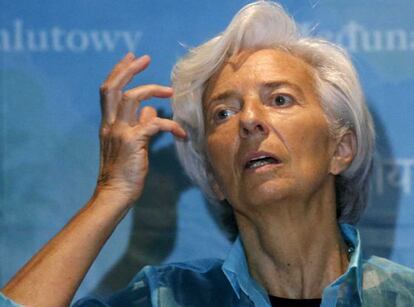IMF calls on Spain to raise VAT and enable cheaper layoffs
International body tells the government to make more reforms to bolster the recovery

The International Monetary Fund (IMF) has said it is pleased that the Spanish economic recovery is gaining traction, but that it still wants to see more reforms.
In statements made on Monday ahead of the release of the organization’s annual report on Spain, IMF officials called on the government to make it cheaper for companies to lay off workers, to increase value-added tax (VAT), and to introduce healthcare co-payment in order to bolster the Spanish economy.
These conclusions are part of the preliminary findings of IMF staff at the end of their official mission to Spain. These findings will later be collected in a report and put to the IMF executive board for approval.
Additional fiscal savings could be generated – for example, by reducing the costs of providing public health and education services”
“Spain has rebounded strongly and employment is increasing, helped by past reforms. However, the level of unemployment is still painfully high and vulnerabilities remain,” the fund said in a release issued on Monday. “Sustaining job-rich growth at the current pace, further reducing public and private indebtedness, and maintaining confidence will require additional fiscal efforts and structural reforms.”
The IMF has now raised its Spanish growth forecast for 2015 to 3.1%, even higher than the Spanish government’s own prediction of a 2.9% increase.
But the IMF and the European Commission have long been asking Madrid for new labor reforms. One of the proposed measures is a single contract for permanent and temporary workers.
“The new incentives for permanent hires are promising, but the cost of dismissing a permanent worker is still much higher than that for a temporary one, and this gap should be closed,” the IMF said, adding that cheaper, easier ways of firing long-term workers would help encourage more open-ended contracts.
After praising the increased wage flexibility introduced by Spanish authorities in recent years, the IMF said that “maintaining wage growth in line with productivity and external competitiveness is key to sustaining job creation.”
The IMF also wants the Spanish government to help small and medium businesses by fostering competition, eliminating hurdles and supporting exports. “Efforts should continue to strengthen SMEs’ access to market-based financing,” it said.
The IMF recommends further strengthening banks while reducing private debt, and fiscal consolidation, including an end to special low VAT rates enjoyed by certain products.
Spain has rebounded strongly and employment is increasing, helped by past reforms”
“Raising excise duties and environmental levies, and gradually reducing value-added tax (VAT) preferential treatments would bring Spain’s collection efforts more in line with those of other European countries.”
The fund has also explored the savings to be made by cutting back on public health and education spending.
“At the regional level, additional fiscal savings could be generated – for example, by reducing the costs of providing public health and education services and, as recommended by the Tax Reform Expert Committee last year, by increasing regions’ responsibility to co-pay for these services.”
Tu suscripción se está usando en otro dispositivo
¿Quieres añadir otro usuario a tu suscripción?
Si continúas leyendo en este dispositivo, no se podrá leer en el otro.
FlechaTu suscripción se está usando en otro dispositivo y solo puedes acceder a EL PAÍS desde un dispositivo a la vez.
Si quieres compartir tu cuenta, cambia tu suscripción a la modalidad Premium, así podrás añadir otro usuario. Cada uno accederá con su propia cuenta de email, lo que os permitirá personalizar vuestra experiencia en EL PAÍS.
¿Tienes una suscripción de empresa? Accede aquí para contratar más cuentas.
En el caso de no saber quién está usando tu cuenta, te recomendamos cambiar tu contraseña aquí.
Si decides continuar compartiendo tu cuenta, este mensaje se mostrará en tu dispositivo y en el de la otra persona que está usando tu cuenta de forma indefinida, afectando a tu experiencia de lectura. Puedes consultar aquí los términos y condiciones de la suscripción digital.









































